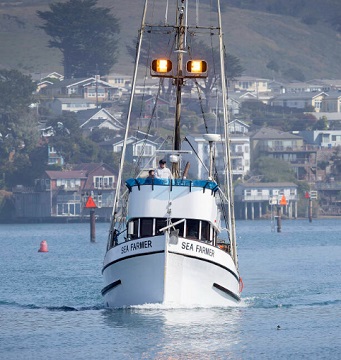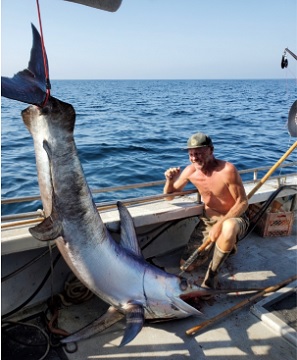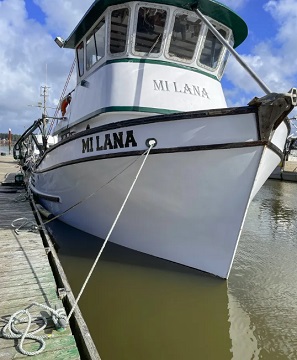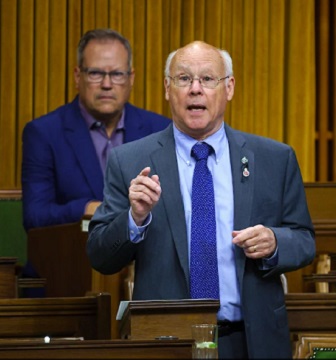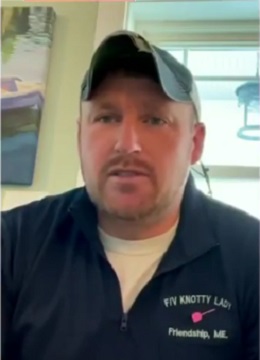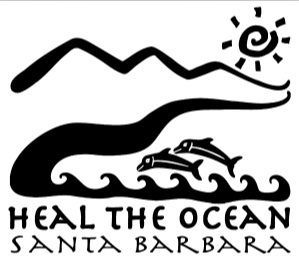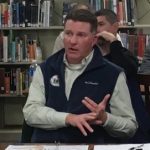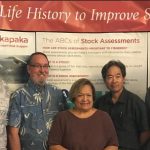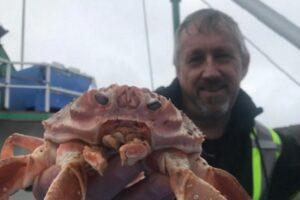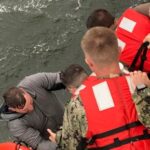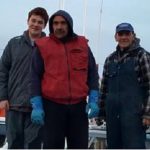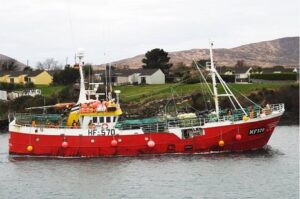Category Archives: Pacific
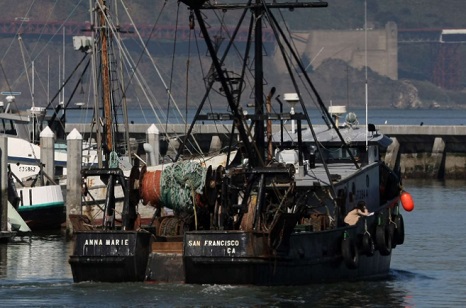
Oregon Fishing Industry Fed Up With Agency ‘Ignoring’ Their Offshore Wind Concerns
The West Coast Seafood Processors Association, the Midwater Trawlers Cooperative and the Oregon Dungeness Crab Commission claim their concerns about proposed offshore wind project call areas, areas where the agency is seeking public comment, and their impact on key fish populations due to the turbines’ electromagnetic field (EMF) cables, have been ignored by BOEM. They also worry about the impact offshore winds would have on their businesses and the entire state’s economy. “BOEM has told us that if Oregon doesn’t want this, they will back off and pursue other offshore wind areas, and we’ve made it pretty clear to them that Oregon doesn’t want this, and they’re still pushing forward,” Lori Steele, executive director of the seafood trade group West Coast Seafood Processors Association, told the DCNF. “They are giving us nothing but lip service,” she added. >click to read< 09:43
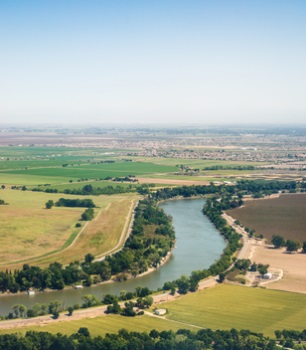
Salmon fishermen reflect on causes, future as closure looms
Earlier this year, Governor Gavin Newsom signed an executive order urging California’s water board to waive environmental laws and reserve water for future agricultural use, that would otherwise be released to help insure the survival of native fish and wildlife species. “The politics of water mismanagement readily and consistently traverses party lines,” Davis said. “So we’re trying to get equitable allocation of the resource to the different sectors, agricultural, residential, and environmental, which supports the salmon.” Tim Obert, a salmon fisherman based out of Santa Cruz, said the ramifications of the closure could be devastating. >click to read< 10:16
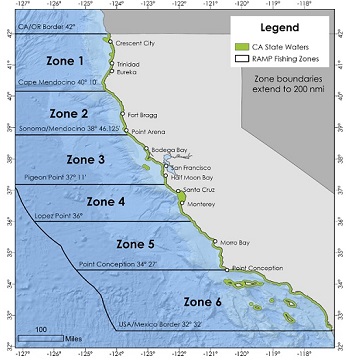
CDFW Announces Closure Of Commercial Dungeness Crab Fishery Off Central California To Protect Humpback Whales
California Department of Fish and Wildlife (CDFW) Director Charlton H. Bonham has assessed entanglement risk under the Risk Assessment Mitigation Program (RAMP) and announced a fishery closure for the commercial Dungeness crab fishery in fishing zones 3, 4, 5 and 6 (Sonoma/Mendocino county line to the U.S./Mexico border) effective at noon on April 15, 2023. The take and possession of Dungeness crab is therefore prohibited after noon on April 15, 2023, in fishing zones 3-6. This season closure is being implemented to minimize entanglement risk for humpback whales as they return to forage off the coast of California and in response to several entanglements that occurred during March and April of 2022. >click to read< 06:53
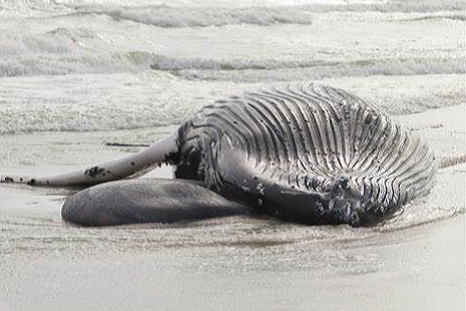
Dem senators from 4 states ask NOAA to address whale deaths
Democratic U.S. Senators from four states want federal environmental officials to address a spate of whale deaths on both coasts, urging “transparency and timeliness” in releasing information about whale deaths and their causes. The call late Tuesday by New Jersey Sens. Robert Menendez and Cory Booker; Connecticut Sen. Richard Blumenthal, Oregon Sen. Jeff Merkley, and Rhode Island Sen. Sheldon Whitehouse for action by the National Oceanic and Atmospheric Administration marked the first large-scale request for action by Democratic federal lawmakers on an issue that has rapidly become politicized. Thus far, mostly Republican lawmakers have called for a pause or an outright halt to offshore wind farm preparation work, which they blame for the deaths of whales along the U.S. East Coast since December. But in their letter to a NOAA administrator, the Democratic senators conspicuously did not blame — or even mention — offshore wind as a potential cause of the deaths. >click to read< 16:52
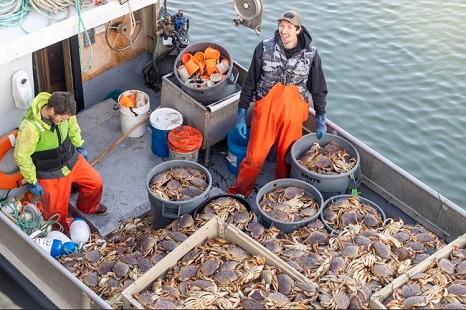
Willapa Bay crabbers deliver record haul
More than 1.5 million pounds of Dungeness crab have been caught by commercial fishermen in the bay this year, far exceeding previous annual landings records over the past 25 years. Despite a two-month delay in the 2022-2023 season that eventually began Feb. 1, the current commercial Dungeness landings are about 1.54 million pounds as of Monday, March 27, a roughly 23% increase over the previous record of 1.19 million pounds caught during the entire 2010-2011 season. Pinched by inflated fuel and expenses and a low price from processors, commercial crab fishermen would rather put this current season behind them as they prepare for the next fishery. “It’s been above average,” said commercial fishermen Ross Kary. “But with the crab price it’s still not the best year I’ve had. With the price of everything, expenses are really high. We were lucky to not go bankrupt.” Photos, >click to read< 20:20
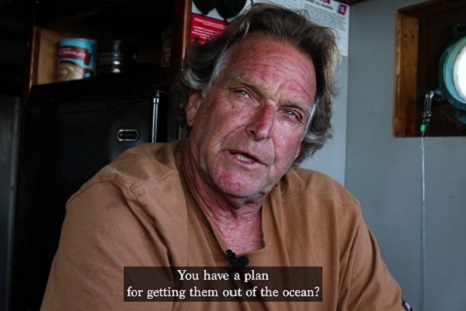
Morro Bay – Winds of Change
The offshore wind industry is expected to grow in coming years, sourcing a global market for renewable energy. The waters off Morro Bay have been sanctioned by The Bureau of Ocean Energy Management (BOEM) as a viable site for offshore wind development, considering the town’s existing electrical transmission capabilities. The introduction of an offshore wind farm would have devastating effects on Morro Bay due to the town’s historic reliance on the fishing industry. This project has the potential to displace fishermen and cause widespread economic harm to the community. Winds of Change explores the complexities of this case, while giving underrepresented fishermen a voice in the matter. Video, >click to watch< 10:01
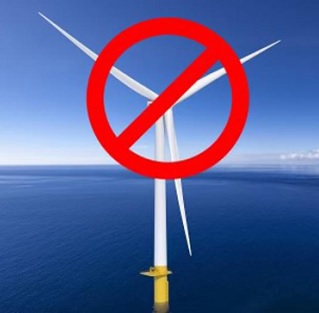
Resistance to Offshore Wind Is Growing on US Coasts
A growing chorus of interest groups is calling for a pause in offshore wind activities to allow further assessment of the sector’s impacts on the marine ecosystem. Fishing groups and local residents have filed five lawsuits against proposed or under-construction wind projects along the Atlantic seaboard. A leading body for the U.S. Pacific fishing industry is urging the federal government to call off its proposed auction for offshore wind off the Oregon coast. And the United States’ largest lobbying group for Native Americans recently called for a halt to all offshore wind scoping and permitting. Wind energy is a key component of the Biden Administration’s climate agenda. >click to read< 08:10
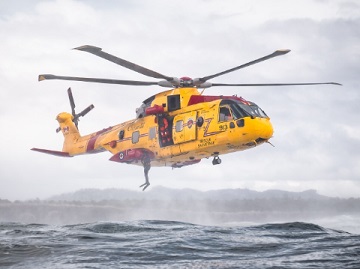
Vancouver Island military search and rescue crews train with U.S. Coast Guard
Crews from 19 Wing Comox are back on the ground after attending a week of specialized training in the United States, learning special techniques to get in and out of extreme ocean waves. “It was awesome to be able to train in a more realistic environment, out of our normal rules,” said Master-Cpl. Carl Mozienko of Comox’s 442 Transport and Rescue Squadron. Three pilots, two flight engineers and three search and rescue technicians, spent five days training with members of the U.S. Coast Guard down in Astoria, Oregon, near the mouth of the Columbia River. The location was chosen because of its rough seas, according to Brad Pigage, a chief aviation survival technician for the Advanced Helicopter Rescue School. Photos, >click to read< 12:47
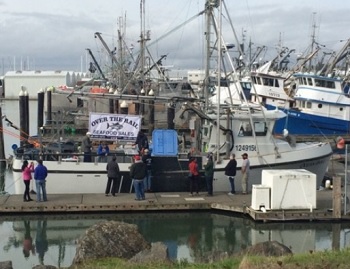
Crew Connections to provide commercial fishing networking on March 18
Commercial fishing vessel captains and owners will be recruiting new crew members to help with the summer fishing season from 11 a.m. to 2 p.m. Saturday, March 18 at Bellingham Dockside Market. Those interested are encouraged to bring their resume and ask questions. Whatcom Working Waterfront Coalition and Foundation is hosting the networking event, Crew Connections, in partnership from the port of Bellingham and Bellingham Dockside Market. Crew Connections will take place at the Fishermen’s Pavilion, 2599 S. Harbor Loop Drive in Bellingham. >click to read< 12:55
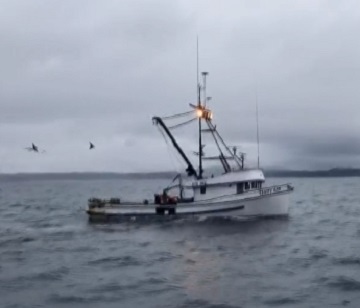
Imperiled Chinook salmon runs close ocean fishing off California, much of Oregon
The closure currently runs through May 15 and affects a length of the coast stretching from Oregon’s Cape Falcon, near Cannon Beach, south to the Mexican border. And it could be extended, officials said, as the imperiled species struggles amid a long-running drought. Further closures are likely, said Eric Schindler, head of the Oregon Department of Wildlife’s Ocean Salmon Program.“It doesn’t look good for this year or next year, and possibly the year after that, because of the drought conditions in California,” Schindler said. “We have to make sure that we’re not undermining our ability to produce salmon for the next go around.” Video, >click to read< 10:35
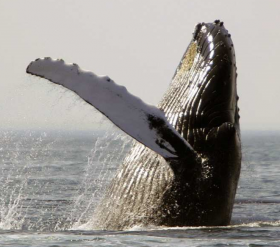
Whales win in federal fight over sablefish net permit
A federal judge has awarded summary judgment to environmental advocates over the National Marine Fisheries Service’s handling of endangered Pacific humpback whales that get tangled in fishing gear off the Pacific coast. U.S. District Judge James Donato ruled in favor of the Center for Biological Diversity, which sued the feds in 2022 over a permit that authorized the incidental taking of endangered humpback whales in a sablefish fishery without also putting plans into place to reduce the number of entanglements. The organization said the permit was unlawful because the service “did not first ensure that a take reduction plan for the whales had been developed or was being developed, as required.” >click to read< 11:05
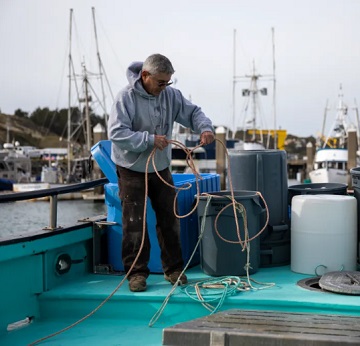
No California salmon: Fishery to be shut down this year
Last year, California’s commercial and recreational fishing fleet, from the Central Coast to the Oregon border, landed about 300,000 salmon. But this year, Davis and other salmon anglers won’t be fishing for salmon at all. Last year, the industry’s economic value was an estimated $460 million for fish sales and related businesses, including restaurants, tackle shops, private fishing guides, campgrounds and other services. Salmon season usually runs from May through October. Only in two previous years — 2008 and 2009 — has California’s salmon season been shut down completely. That closure came as the numbers of spawning fish returning to the Sacramento River, the state’s main salmon producer, crashed to record lows. Now California’s Chinook runs have collapsed again. >click to read< 09:54

California crabber accuses processor of price fixing
A Portland, Oregon seafood processor, the country’s largest, faces an antitrust class action over what the lead plaintiff says is an egregious case of price fixing in the West Coast’s increasingly unstable Dungeness crab market. Fisherman Brand Little of Auburn, California, filed a putative class action Monday accusing the $945 million company with fixing the price of the highly sought after Dungeness crab, which is found along the coasts and bays between Central California and Alaska. Little says Pacific Seafood, which is owned by Frank Dulcich, the grandson of the company’s founder, has “for at least the last four years, and likely substantially longer” fixed the prices paid to the region’s crabbers. That has in turn dramatically reduced the amount of money earned by the crabbers and priced out customers during the peak demand period while forcing them to buy frozen crab from the previous year, also supplied by Pacific Seafood. >click to read< 12:21
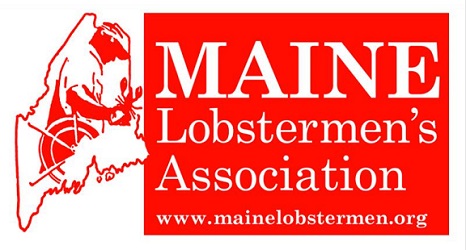
Maine Lobster Fishery Sues Monterey Bay Aquarium, Claims Attack on Maine Lobster Fishing Practices Is Defamatory
Maine lobster businesses and industry trade associations today filed a federal lawsuit against the Monterey Bay Aquarium Foundation (the “Aquarium”) for making false and defamatory statements about Maine lobster fishing practices and for misleading consumers and commercial lobster buyers about the integrity of the Maine lobster harvest. The lawsuit challenges the Aquarium’s claims that “scientific data” show that Maine lobster fishing practices are responsible for harming North Atlantic right whales. The lawsuit asserts that the Aquarium’s claims are in fact not supported by science, and that the Aquarium’s false statements have caused substantial economic harm to plaintiffs, as well as to the Maine lobster brand and to Maine’s long-standing reputation for a pristine coastal environment protected by a multi-generational tradition of preserving resources for the future. Plaintiffs include Bean Maine Lobster Inc., the Maine Lobstermen’s Association (MLA), the Maine Coast Fishermen’s Association, Atwood Lobster LLC, and Bug Catcher Inc., owned by sixth-generation fisherman Gerry Cushman of Port Clyde. To continue, >click to read< 12:57
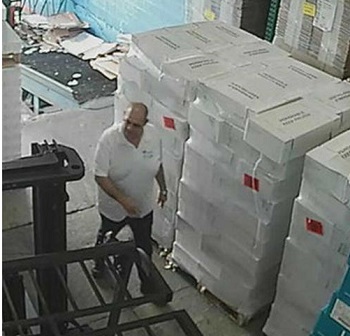
Florida man used fake names in six-figure Stanwood crab heist
A Florida man faces federal charges in a conspiracy to transport over $430,000 worth of stolen king crab from Stanwood to Florida, according to charges filed in U.S. District Court in Seattle. A federal grand jury indicted David Subil, 51, on three counts of interstate transportation of stolen property on March 1. The alleged cross-country crab heist began Jan. 3. Multiple people claiming to represent Safeway contacted the owner of a California-based seafood distribution company called Arctic Seafoods, the charges say. A man who identified himself as Christopher Delgado sent the owner documents to open an account with Albertsons, the parent company of Safeway. >click to read< 10:20
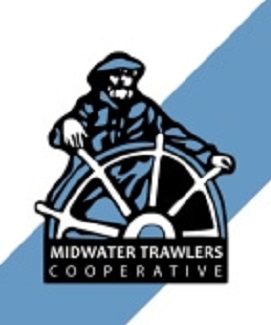
Pacific Fishery Management Council says Rescind Oregon OSW Call Areas
The Pacific Fishery Management Council acted today to join a chorus of voices recommending the Bureau of Ocean Energy Management rescind the current Oregon call areas designated for floating offshore wind energy development. Heather Mann, Executive Director of the Midwater Trawlers Cooperative and one of the leaders of the informal coalition Protect US Fishermen said in her testimony, “we hear the climate crisis is so severe that collateral damage to birds, whales, the California current ecosystem, food security, even to fisheries, fishermen and rural community economies is an accepted part of the transition to cleaner energy. That is an unacceptable premise to me, and I hope it is to you as well.” The motion passed unanimously (10-0) with four abstention votes cast by the state representatives for Oregon, Washington, and California as well as the NMFS representative. >click to read< 19:24
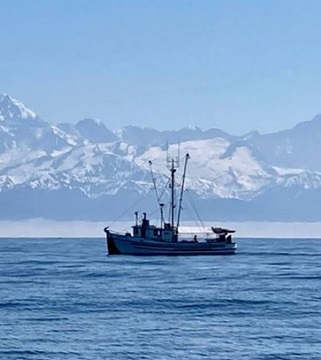
Lawsuit threatens Washington’s commercial fishing families | Opinion
While Alaska might be more than 1,000 miles away, Washington shares a lot more with the 49th State than most people realize. This is especially true in the fishing industry where the relationship between Washington and Alaska runs deep and ripples throughout Washington’s economy and communities. We are seeing the complexities and the nuances of this relationship play out right now in a lawsuit that the Seattle-based Wild Fish Conservancy brought against the National Marine Fisheries Service in 2020 with the goal to shut down southeast Alaska’s small boat, hook-and-line Chinook troll fishery in the misguided name of saving the Southern Resident killer whales. >click to read< 14:57
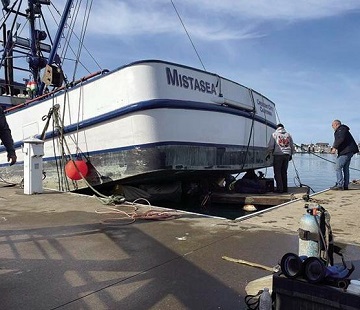
Local fisherman outlines harbor concerns
Randy Smith owns and captains the F/V MISTASEA, a fishing vessel moored in the Crescent City Harbor. As sometimes happens, Smith encountered a mechanical breakdown while crabbing, three weeks ago. Apparently, F/V MISTASEA lost rudder control and possibly broke the drive shaft. Smith needed immediate assistance. With the help of his brother crabbers, Fashion Blacksmith, and several very knowledgeable marine diver experts, Smith was able to ease his vessel back into the Harbor; that’s the good news. F/V Mistasea was unable to be lifted onto the excavator at Fashion Blacksmith pier because of the tide level, and the buildup of mud and sludge due to zero dredging since 2013 allowed this immediate crisis to escalate. Photos, >click to read< 07:42
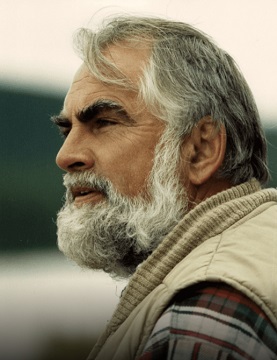
In memory of Carl Arvidson
Cordova recently lost a great fisherman. Carl Godfred Arvidson passed away during the evening of Feb. 21 in the arms of his wife, Suzanne Arvidson, in Carson City, Nevada. Carl was born in Cordova. His family entered the local fisheries in the early 1900s, when his father, Gus (John Gustav) Arvidson, made his way from Sweden to Alaska. Gus married another young immigrant, Minnie,,, Gus Arvidson plied his trade in the waters of the Copper River Delta. When he started fishing, he had to row his boat to the fishing grounds and haul in his net by hand, both formidable feats. At the young age of 38, he suffered an injury while at sea, returned to town and passed away. He was survived by his wife and seven young children. At the time, Carl was a tender 5 years old. When Carl and his three brothers, Gus, George and Bob, came of age, they knew their best opportunity for success in Cordova was in the commercial fishing industry. They all entered the treacherous industry. >click to read< 18:35
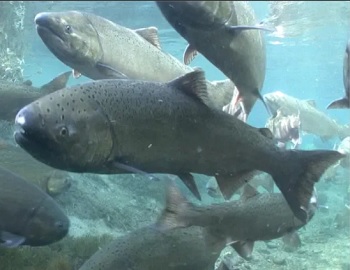
Oregon fishing season called off due to dwindling salmon populations
An extremely low “abundance” of California Chinook salmon stocks and projected low spawning escapements has led to the cancellation of the upcoming commercial and recreational salmon fishing season along most of the Oregon coast. Thursday’s announcement came in two parts from the Oregon Department of Fish and Wildlife, with both actions canceling fishing seasons between March 15 and May 15, 2023. According to Fish and Wildlife, the action applies to all commercial ocean troll salmon fishery seasons from Cape Falcon to the Oregon-California Border. Meanwhile, recreational salmon fishing has been canceled in ocean waters between Cape Falcon and Humbug Mountain off the Oregon coast. >click to read< 08:45
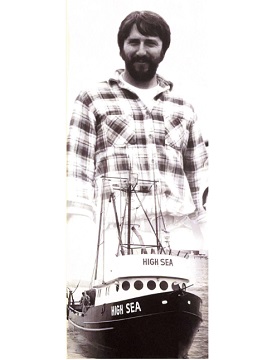
“Retired” Commercial Fisherman Carroll Richard Johnson of Fortuna, has passed away
Carroll Richard Johnson passed away unexpectedly on January 27, 2023. Carroll, the oldest of three children, was born on August 17, 1953, to Shirley Irene Swall and Richard Leonard Johnson. Carroll grew up in Fortuna. At the age of nine, Carroll started working in the fishing industry, and spent summers and weekends fishing on his dad’s commercial boat. In 1973, at the age of 20, he married his high school sweetheart, Lynne Dorris, and together they bought their first fishing vessel, the Helen Marie. Later, they were partners with a friend in owning and operating the Ocean Fresh Fish market in Fortuna and had three daughters together. Carroll fished commercially for salmon, tuna, and crab with the Helen Marie, Lettie M, and Belle J II, and also trawled with the Clara G, High Sea, and Stormbringer. His most recent fishing vessel was the Rian Faith, which he fished while living his “retired” life. >click to read< 09:43
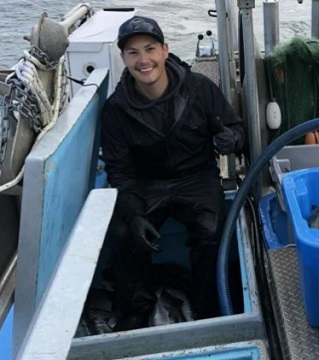
Union files petition in Ottawa to stop foreign ownership of fishing licences and quotas
The union representing commercial fishing industry workers has filed a petition with the House of Commons to put a formal end to further ownership or beneficial interest in Canadian licences and quotas by foreign interests. “If you’re a young entrant or been fishing for a long time and desire to become a owner-operator, you’re in direct competition from foreign interests,” said Orr. “In the socio-economic view on a broader scale, we’re already seeing the dismantlement of the infrastructure that supports the fishing industry on our coast. Fewer and fewer fish processing sites, fewer boat repair shops. >click to read< 08:56






